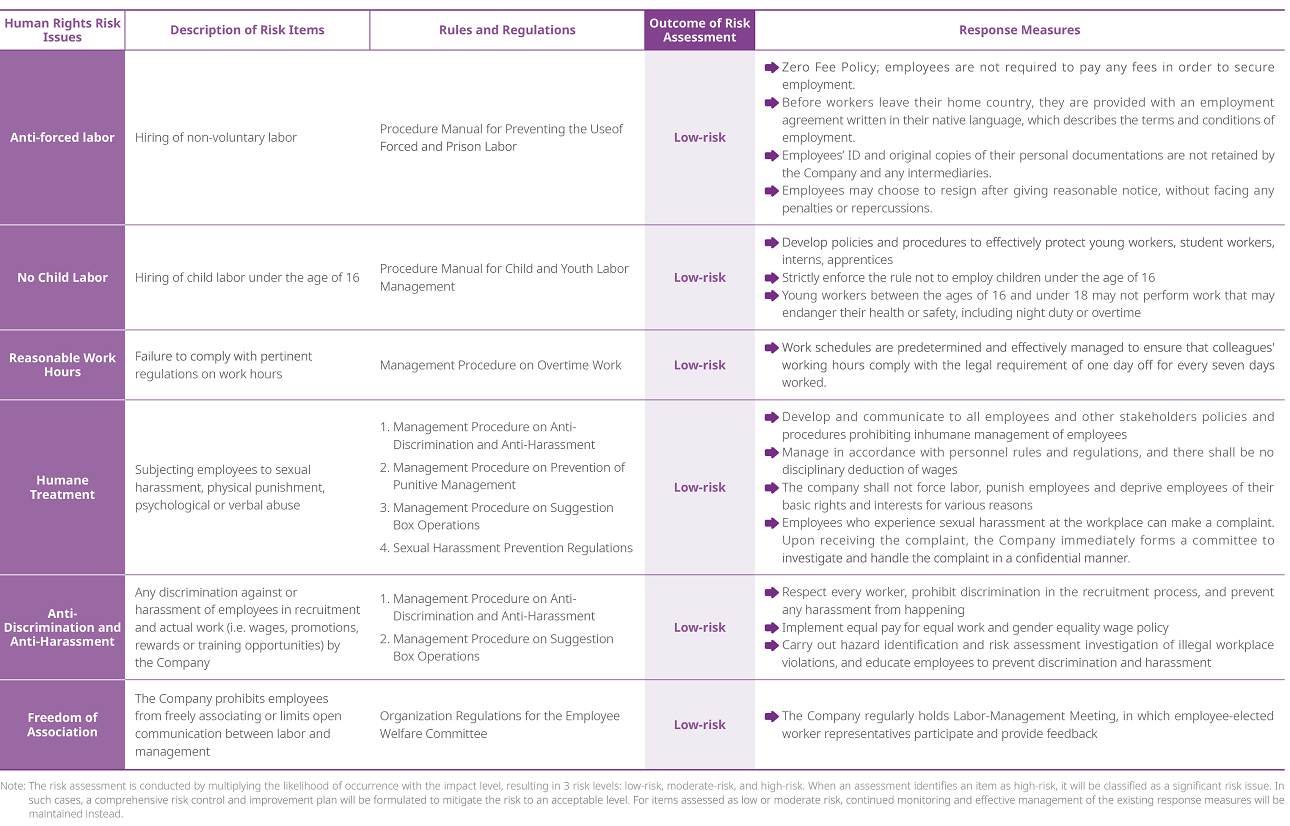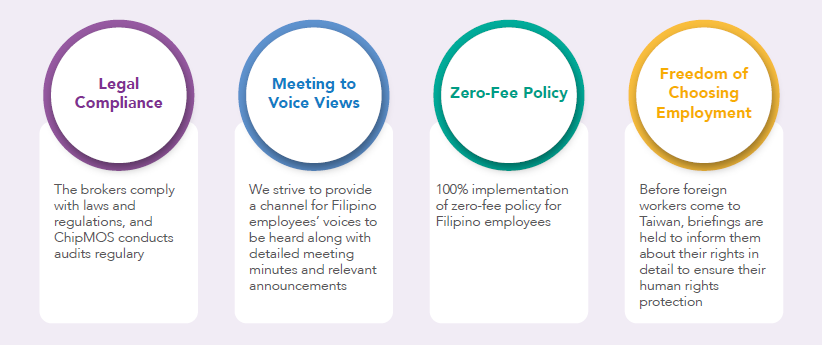Human Rights

Management Approach
ChipMOS In alignment with the core principles of The United Nations Global Compact (UNGC), the Universal Declaration of Human Rights, the International Labour Organization (ILO) standards, and the OECD Guidelines for Multinational Enterprises, ChipMOS has implemented the corresponding management procedures. Although ChipMOS does not have collective bargaining agreements with employees, we fully comply with applicable laws and explicitly affirm our commitment to protecting employees' human rights through various official documents, including legal requirements, employment freedom, humane treatment, anti-discrimination and anti-harassment, protection of employee opinions, etc. Furthermore, to promote harmonious labor relations, we provide multiple communication channels, and regularly hold Labor-Management Meetings to promote labor communication and human rights-friendly management. In compliance with the Labor Standards Act, we also adhere to the statutory minimum notice periods for operational changes. In addition to protecting employees, we also extend the influence to suppliers to ensure the protection of human rights throughout the entire supply chain.
Risk Management and External Evaluation Mechanism
ChipMOS conducts internal human rights risk assessments to identify key issues and implement measures that effectively protect the rights of its employees and non-employee workers. The company provides regular human rights training to ensure all employees understand their rights. Additionally, an annual external evaluation is performed to verify the company’s commitment to upholding human rights.
ChipMOS Human Rights Risk Assessment and Response

External Evaluation Mechanism
ChipMOS conducts annual labor rights and ethical risk assessments to ensure effective management of human rights issues across the entire plant and mitigate various labor rights and ethical risks. Since 2016, we have implemented the RBA Responsible Business Alliance Code of Conduct Self-Assessment Questionnaire (SAQ) and internal audit procedures annually to evaluate and verify human rights risks. Through proactive self-assessments, we improve our measures to effectively reduce or eliminate various labor rights and ethics risks, fostering an equitable and respectful work environment. In the 2024 assessment, ChipMOS overall score at the corporate level and at each operational site was ≥80, categorizing all facilities, including Hsinchu fab., Zhubei fab., Zhubei fab. 2, Hukou fab., Tainan fab., and Tainan fab. 2, as low-risk.
Since 2015, ChipMOS Tainan fab. has proactively applied for the RBA Validated Audit Program (VAP). This program is conducted by a third-party certification body appointed by RBA to evaluate the effectiveness and implementation of environmental and social sustainability management systems. In 2022, the scope of the VAP certification was expanded to include Hsinchu fab. and Zhubei fab. In line with our sustainability policy, we continue to apply for VAP certification every two years. In 2024, both Hsinchu fab. and Zhubei fab. received a score of 200 (Platinum level) in their audits. Through this ongoing evaluation, we ensure the continuous review of human rights management and the implementation of sustainable development practices.
Note:
SAQ assessment risk level: (1) ≥80 is classified as low risk, (2) ≥60 points and <80 as medium risk, (3) <60 as high risk
VAP assessment risk level: (1) >200 is classified as platinum level, (2) 180~200 is classified as gold level, (3) <180 is classified as silver level
Human Rights Related Training
To protect employees’ interests and fulfill the corporate social responsibilities, ChipMOS has promised to conform to RBA 7.0 code of conducts, to ensure employees fully understand their own interests, healthy and safe working fields, environmentally protective actions, Regulations Governing Professional Moral Conduct of the Company, and the implementation of human right education and corporate social responsibilities in the management system. All employees must receive the human right education and trainings when they come onboard.
Diversification and Inclusion
With regards to the nationality distribution of ChipMOS employees, 71.82% Taiwanese nationality and 28.18% of foreign nationalities (Note 1), mainly Filipino. At ChipMOS, we believe that creating a friendly workplace environment and establishing sound policies are basic to the sustainable development of an organization. We seek to foster a workplace culture of Diversity, Equality, and Inclusion by recruiting diverse talents and broadening the horizons and careers of our employees, ensuring employees are suitable for their roles. We take good care of our Filipino employees through a comprehensive migrant management system, and we also offer long-term retention bonuses, thus achieving effective talent retention. The percentage of our Filipino employees who have served for more than 9 years is 9.97%, demonstrating that our employees have a sense of belonging in ChipMOS, and are able to work with stability and peace of mind.
To evaluate the convenience of machine operation and communication, we mainly chose Filipinos whose official language is English to reduce the risks of work discomfort and misunderstanding. In addition, to help alleviate economic burden on Filipino employees, we pay for full employment fees before and after onboarding. We are committed to complying with the relevant requirements of international labor conventions and RBA. At the same time, we actively promote the life, physical, and psychological care of Filipino employees and provide workplace support and labor security for overseas employment. In 2022, the Company started promoting contract renewal incentives for Filipino employees and provided them with retention incentives after their contracts expired. Aside from Filipino employees, the Company started to hire immigrants, regardless of nationality, in 2021. We provide immigrants with learning opportunities and enable them to acquire skills; in 2024, the company began hiring overseas Chinese students after their graduation in Taiwan. We promote diversified recruitment, offering jobs to people of diverse backgrounds while also reducing the Company's shortage of workforce to achieve a win-win situation.
Note 1: Foreign employees refer to Filipino employees, Filipino/Chinese Immigrants, and students of Chinese nationality.
Principles of Foreign Employee Care

Promoting Employment Opportunities for the Disabled
ChipMOS has been working with local government disability employment agencies and associations for the visually impaired and hearing-impaired to promote employment opportunities for people with disabilities, fostering a diverse and inclusive workplace. ChipMOS endeavored to promote relevant assistive measures for improved accessibility for our hearing-impaired employees, including communication aids for them to adapt to the workplace successfully; their jobs are also appropriately adjusted depending on their learning progress; meanwhile, visually impaired massage therapists are employed in the plants to provide services. The guide dogs are permitted to enter the plants to accompany them to work and assist the visually impaired to walk safely. We will continue to provide and manage our diverse employment channels, and provide suitable work content for the disabled, creating a barrier-free and friendly work environment where disabled employees can realize their potential and demonstrate their value.
Diverse Communications and Appeal Systems
ChipMOS have established diverse and open communication channels and comprehensive internal and external complaint mechanism, which include periodical meetings, employee suggestion box, Chairman's mailbox, Audit Committee Mailbox, mailbox of information security committee, contact in person or by phone, employee interview, EAP hotline and special communication channel, and more. Through these channels, employees and stakeholders can raise concerns about potential or actual negative impacts caused by the company and seek assistance. This ensures the protection of the rights and interests of all employees, customers, and suppliers. The responsible departments handle these matters with complete confidentiality and anonymity, aiming to facilitate open communication and effectively address relevant issues. The event completion rate is used as the follow-up indicator. We are committed to promoting labor-management communication and human rights-friendly management.
In response to the Company's implementation of RBA, if employees have questions about the policy or are willing to provide practical suggestions, the Company encourages employees to share their opinions with the audit unit or other responsible departments and make improvement suggestions to manifest the spirit of mutual good. When stakeholders of the Company have concerns about the Company's business activities, such as illegal or improper incidents, or situations that may harm their own interests, they can report them through the Audit Committee Mailbox or directly approach the Legal Office and Audit Office.